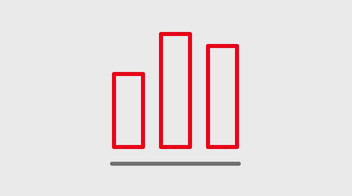Income development
The economic trend of DB Group in 2023 was marked by additional burdens, primarily from the expansion of measures to improve the quality and availability of the rail infrastructure, which were prefinanced to a considerable extent (> € 1 billion) for the Federal Government. Higher costs due to inflation (including for personnel and purchased services) also had an effect. The result for passenger transport was at the same weak level as in the previous year. At DB Schenker, profit development was weaker than in the exceptionally strong previous year, although it remained well above the pre-Covid-19 level. A price-related improved development at DB Cargo and DB Energy had a positive effect.
Operating profit figures fell noticeably; adjusted EBIT was negative. In passenger and rail freight transport the profit situation remained under pressure.
- In the Integrated Rail System, higher expenses, in particular for materials (especially additional infrastructure measures prefinanced for the Federal Government), and personnel (capacity expansion and collective bargaining agreement effects) exceeded revenue growth as a result of performance gains in passenger transport, higher concession fees at DB Regional as well as price effects at DB Energy and DB Cargo.
- Operating profit development at DB Schenker was weaker, driven mainly by the development of freight rates in air and ocean freight, but remained well above the pre-Covid-19 levels.
Additional information is available in the section “Development of business units”.
Transition to the adjusted statement of income
- Special issues are eliminated in the adjusted statement of income. The transition to the adjusted statement is a two-step process: firstly, standard reclassifications are carried out, then the figures are adjusted for individual special items.
- The reclassifications essentially relate to two issues.
- The first issue is the reclassification of net interest income components not related to net financial debt and pension provisions: predominantly the compounding and discounting effects of long-term provisions (excluding pension obligations) and non-current liabilities (excluding financial debt). The non-operational character of these components can also be seen in the fact that their influence on net interest income very much depends on the interest rates as of the balance sheet date.
- The second reclassification relates to the amortization of intangible assets capitalized in the course of purchase price allocation (PPA) of acquisitions conducted during the assessment of long-term customer contracts. Existing transport contracts are an essential component of the purchase price valuation, in passenger transport in particular. In order to safeguard the operating assessment and to prevent these contracts from being treated differently from other transport contracts, these amortization components are eliminated from the operating profit.
- Adjustments for special items involve issues which are extraordinary based on the reasons for them and/or the amounts involved, and which would effect a material change on operating development over time. Book profits and losses from transactions with subsidiaries/financial assets are adjusted regardless of their amounts. Individual items are adjusted if they are extraordinary in character, can be accounted for and assessed precisely, and are significant in volume.
Transition to the adjusted statement of income / € million | 2023 | Reclassifications | Adjustment for special items | 2023 adjusted | 2022 adjusted | Change | |||
absolute | thereof scope of consolidation effects | thereof exchange rate effects | % | ||||||
Revenues | 45,191 | – | 3 | 45,194 | 52,085 | –6,891 | +117 | –463 | –13.2 |
Inventory changes and other internally produced and capitalized assets | 4,626 | – | – | 4,626 | 4,115 | +511 | – | +1 | +12.4 |
Other operating income | 3,354 | – | –63 | 3,291 | 3,733 | –442 | +80 | –5 | –11.8 |
Cost of materials | –25,276 | – | –148 | –25,424 | –32,017 | +6,593 | –28 | +298 | –20.6 |
Personnel expenses | –19,604 | – | 273 | –19,331 | –18,153 | –1,178 | –68 | +82 | +6.5 |
Other operating expenses | –5,652 | – | 173 | –5,479 | –4,980 | –499 | –106 | +48 | +10.0 |
EBITDA | 2,639 | – | 238 | 2,877 | 4,783 | –1,906 | –5 | –39 | –39.8 |
Depreciation | –3,912 | 10 | 61 | –3,841 | –3,558 | –283 | –89 | +18 | +8.0 |
Operating profit/loss (EBIT) | EBIT adjusted | –1,273 | 10 | 299 | –964 | 1,225 | –2,189 | –94 | –21 | – |
Net interest income | Operating interest balance | –617 | –12 | 9 | –620 | –467 | –153 | –8 | –0 | +32.8 |
Operating income after interest | –1,890 | –2 | 308 | –1,584 | 758 | –2,342 | –102 | –21 | – |
Result from investments accounted for using the equity method | Net investment income | 9 | 4 | – | 13 | –4 | +17 | –0 | –0 | – |
Other financial result | –78 | 8 | – | –70 | 129 | –199 | –14 | +16 | – |
PPA amortization customer contracts | – | –10 | – | –10 | –5 | –5 | – | –0 | +100 |
Extraordinary result | – | – | –308 | –308 | 212 | –520 | – | +8 | – |
Profit/loss before taxes on income | –1,959 | – | – | –1,959 | 1,090 | –3,049 | –128 | +3 | – |
Taxes on income | –73 | – | – | –73 | –1,143 | +1,070 | – | – | –93.6 |
Actual taxes on income | –265 | – | – | –265 | –447 | +182 | – | – | –40.7 |
Deferred tax expense (–)/income (+) | 192 | – | – | 192 | –696 | +888 | – | – | – |
Net loss for the year (continuing operations) | –2,032 | – | – | –2,032 | –53 | –1,979 | –128 | +3 | – |
Net loss for the year (discontinued operations) | –319 | – | – | –319 | –174 | –145 | – | – | +83.3 |
Net loss for the year | –2,351 | – | – | –2,351 | –227 | –2,124 | –128 | +3 | – |
DB AG shareholders | –2,399 | – | – | –2,399 | –274 | –2,125 | – | – | – |
Hybrid capital investors | 25 | – | – | 25 | 25 | – | – | – | – |
Other shareholders (non-controlling interests) | 23 | – | – | 23 | 22 | +1 | – | – | +4.5 |
Earnings per share (€ per share) | |||||||||
Undiluted | –5.58 | – | – | –5.58 | –0.64 | –4.94 | – | – | – |
Diluted | –5.58 | – | – | –5.58 | –0.64 | –4.94 | – | – | – |
Values for 2022 adjusted due to reclassification of DB Arriva.
Development in the year under review
The income situation declined overall:
- Revenues (–13.2%/€ –6,891 million): significant decline in revenues driven by DB Schenker.
- Other operating income (–11.8%/€ –442 million): Decline mainly due to the absence of income from the sale of real estate and lower Government grants for the rectification of flood damage at DB Netze Track as a result of the flood in Ahrtal in 2021. At DB Regional and DB Long-Distance, the loss of Covid-19-related Government grants also had a negative impact on income.
Expenses also fell, driven, among other things, by freight rate development at DB Schenker. However, as a result of higher personnel expenses and the implementation of additional infrastructure measures that were prefinanced for the Federal Government, expenses in relation to income fell disproportionately overall:
- Cost of materials (–20.6%/€ –6,593 million): The noticeable decline was primarily driven by lower freight rates at DB Schenker. This was partly offset by significantly higher expenses in the Integrated Rail System. The main drivers were the expansion of measures to improve the quality and availability of the rail infrastructure, some of which were prefinanced for the Federal Government, as well as increases in energy prices. Furthermore, expenses for rail replacement services increased, due in part to the increased volume of construction in the rail network.
- Personnel expenses (+6.5%/€ +1,178 million): Sharp increase, driven by the Integrated Rail System. In addition to collective bargaining agreements, the higher average number of employees also had an impact here. The slight performance-related decline in expenses at DB Schenker had a dampening effect.
- Other operating expenses (+10.0%/€ +499 million): Significant increase, due among other things to a greater requirement for IT services. The resumption of growth in travel activities, which decreased significantly during the Covid-19 pandemic, and higher rental expenses for buildings, among other things, had an additional impact.
- Depreciation (+8.0%/€ +283 million): Increase due to capital expenditures.
Additional information is available in the section Development of business units.
There was a corresponding notable decline in adjusted EBIT as well as the adjusted EBITDA.
- Operating interest balance: Negative development resulted from the higher interest rate level, which led above all to increased expenses in connection with financial liabilities and pensions.
Operating income after interest also fell noticeably.
- Net investment income: A significant increase at a low level was mainly driven by GHT Mobility GmbH, which had a negative impact on the development of net investment income in the previous year.
- Other financial result: Significant decline, mainly due to negative effects from the compounding and discounting of provisions, exchange rate effects and the market valuation of the holding in Volocopter GmbH. This was counteracted by the positive effects of hedge transactions concluded, which resulted in an income on balance (previous year: expense).
- Extraordinary result: Declined significantly and was negative, due mainly to the adjustment of provisions and restructuring measures. In contrast, positive effects among others due to the energy price brake had a partially compensating effect. In the previous year, the extraordinary result was positive, driven by the implemented Covid-19-related train-path price support (Integrated Report 2022).
Extraordinary result / € million | 2023 | thereof affecting EBIT | 2022 | thereof affecting EBIT |
DB Long-Distance | 112 | 112 | 337 | 337 |
DB Regional | –4 | –4 | 0 | 0 |
DB Cargo | –94 | –94 | –20 | –20 |
DB Netze Track | –23 | –14 | –9 | –2 |
DB Netze Stations | 13 | 13 | – | – |
DB Energy | – | – | – | – |
Other/consolidation Integrated Rail System | –170 | –170 | –90 | –90 |
Integrated Rail System | –166 | –157 | 218 | 225 |
DB Schenker | –142 | –142 | –6 | –6 |
Consolidation other 1) | – | – | – | – |
DB Group 1) | –308 | –299 | 212 | 219 |
thereof restructuring measures | –332 | –332 | –88 | –88 |
thereof additions to provisions for ecological burdens/environ-mental risks | –67 | –67 | – | – |
thereof electricity price brake | 163 | 163 | – | – |
thereof reimbursements of train-path prices | – | – | 316 | 316 |
1) Value for 2022 adjusted due to reclassification of DB Arriva.
Accordingly, profit before income taxes also declined significantly and was negative.
Although the development of the income tax position was significantly better, it nevertheless had a negative impact on development:
- Actual income taxes fell due to declining profits at some foreign Group companies (primarily at DB Schenker).
- Deferred tax income resulted from improved estimates relating to the future use of loss carry-forwards, in particular at DB AG.
As a result, net loss for the year (net loss after income taxes) from continuing operations increased less significantly, but remained noticeably negative. The net loss for the year for discontinued operations was weaker, driven by higher depreciation on held-for-sale assets.


